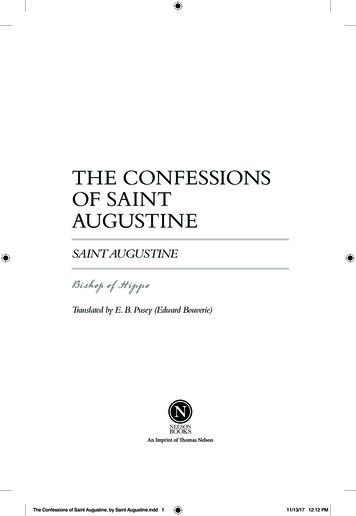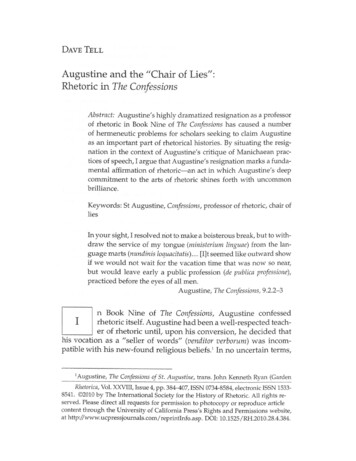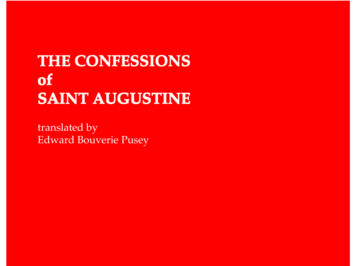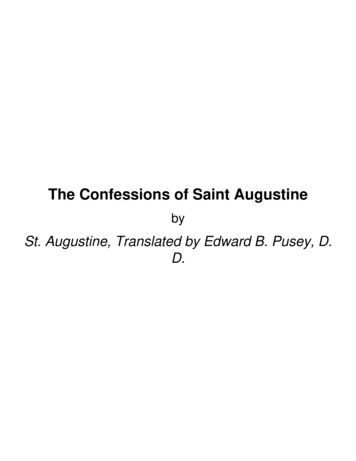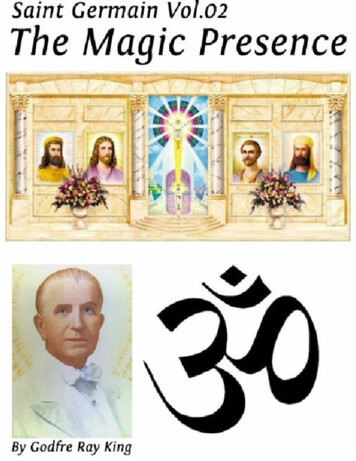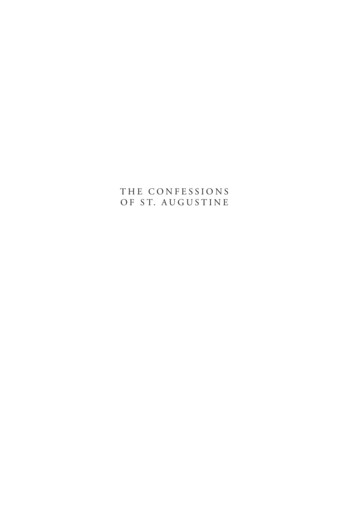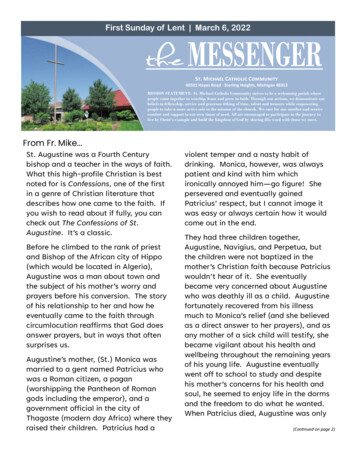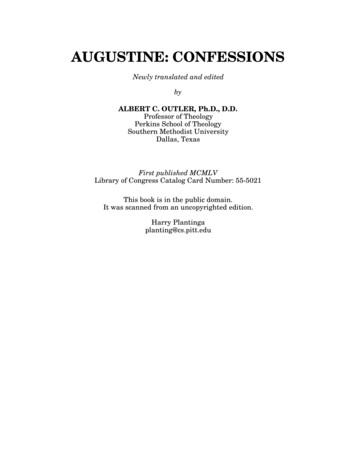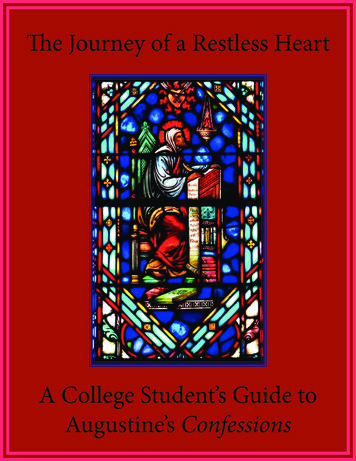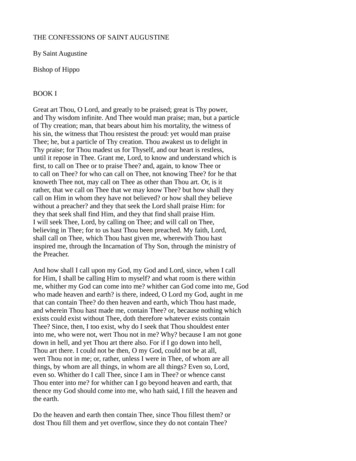
Transcription
THE CONFESSIONS OF SAINT AUGUSTINEBy Saint AugustineBishop of HippoBOOK IGreat art Thou, O Lord, and greatly to be praised; great is Thy power,and Thy wisdom infinite. And Thee would man praise; man, but a particleof Thy creation; man, that bears about him his mortality, the witness ofhis sin, the witness that Thou resistest the proud: yet would man praiseThee; he, but a particle of Thy creation. Thou awakest us to delight inThy praise; for Thou madest us for Thyself, and our heart is restless,until it repose in Thee. Grant me, Lord, to know and understand which isfirst, to call on Thee or to praise Thee? and, again, to know Thee orto call on Thee? for who can call on Thee, not knowing Thee? for he thatknoweth Thee not, may call on Thee as other than Thou art. Or, is itrather, that we call on Thee that we may know Thee? but how shall theycall on Him in whom they have not believed? or how shall they believewithout a preacher? and they that seek the Lord shall praise Him: forthey that seek shall find Him, and they that find shall praise Him.I will seek Thee, Lord, by calling on Thee; and will call on Thee,believing in Thee; for to us hast Thou been preached. My faith, Lord,shall call on Thee, which Thou hast given me, wherewith Thou hastinspired me, through the Incarnation of Thy Son, through the ministry ofthe Preacher.And how shall I call upon my God, my God and Lord, since, when I callfor Him, I shall be calling Him to myself? and what room is there withinme, whither my God can come into me? whither can God come into me, Godwho made heaven and earth? is there, indeed, O Lord my God, aught in methat can contain Thee? do then heaven and earth, which Thou hast made,and wherein Thou hast made me, contain Thee? or, because nothing whichexists could exist without Thee, doth therefore whatever exists containThee? Since, then, I too exist, why do I seek that Thou shouldest enterinto me, who were not, wert Thou not in me? Why? because I am not gonedown in hell, and yet Thou art there also. For if I go down into hell,Thou art there. I could not be then, O my God, could not be at all,wert Thou not in me; or, rather, unless I were in Thee, of whom are allthings, by whom are all things, in whom are all things? Even so, Lord,even so. Whither do I call Thee, since I am in Thee? or whence canstThou enter into me? for whither can I go beyond heaven and earth, thatthence my God should come into me, who hath said, I fill the heaven andthe earth.Do the heaven and earth then contain Thee, since Thou fillest them? ordost Thou fill them and yet overflow, since they do not contain Thee?
And whither, when the heaven and the earth are filled, pourest Thouforth the remainder of Thyself? or hast Thou no need that aught containThee, who containest all things, since what Thou fillest Thou fillestby containing it? for the vessels which Thou fillest uphold Thee not,since, though they were broken, Thou wert not poured out. And when Thouart poured out on us, Thou art not cast down, but Thou upliftest us;Thou art not dissipated, but Thou gatherest us. But Thou who fillestall things, fillest Thou them with Thy whole self? or, since all thingscannot contain Thee wholly, do they contain part of Thee? and all atonce the same part? or each its own part, the greater more, the smallerless? And is, then one part of Thee greater, another less? or, art Thouwholly every where, while nothing contains Thee wholly?What art Thou then, my God? what, but the Lord God? For who is Lordbut the Lord? or who is God save our God? Most highest, most good, mostpotent, most omnipotent; most merciful, yet most just; most hidden,yet most present; most beautiful, yet most strong, stable, yetincomprehensible; unchangeable, yet all-changing; never new, never old;all-renewing, and bringing age upon the proud, and they know it not;ever working, ever at rest; still gathering, yet nothing lacking;supporting, filling, and overspreading; creating, nourishing, andmaturing; seeking, yet having all things. Thou lovest, without passion;art jealous, without anxiety; repentest, yet grievest not; art angry,yet serene; changest Thy works, Thy purpose unchanged; receivest againwhat Thou findest, yet didst never lose; never in need, yet rejoicingin gains; never covetous, yet exacting usury. Thou receivest over andabove, that Thou mayest owe; and who hath aught that is not Thine? Thoupayest debts, owing nothing; remittest debts, losing nothing. And whathad I now said, my God, my life, my holy joy? or what saith any man whenhe speaks of Thee? Yet woe to him that speaketh not, since mute are eventhe most eloquent.Oh! that I might repose on Thee! Oh! that Thou wouldest enter into myheart, and inebriate it, that I may forget my ills, and embrace Thee,my sole good! What art Thou to me? In Thy pity, teach me to utter it.Or what am I to Thee that Thou demandest my love, and, if I give it not,art wroth with me, and threatenest me with grievous woes? Is it then aslight woe to love Thee not? Oh! for Thy mercies' sake, tell me, O Lordmy God, what Thou art unto me. Say unto my soul, I am thy salvation. Sospeak, that I may hear. Behold, Lord, my heart is before Thee; open Thouthe ears thereof, and say unto my soul, I am thy salvation. After thisvoice let me haste, and take hold on Thee. Hide not Thy face from me.Let me die--lest I die--only let me see Thy face.Narrow is the mansion of my soul; enlarge Thou it, that Thou mayestenter in. It is ruinous; repair Thou it. It has that within which mustoffend Thine eyes; I confess and know it. But who shall cleanse it? orto whom should I cry, save Thee? Lord, cleanse me from my secret faults,and spare Thy servant from the power of the enemy. I believe, and
therefore do I speak. Lord, Thou knowest. Have I not confessed againstmyself my transgressions unto Thee, and Thou, my God, hast forgiven theiniquity of my heart? I contend not in judgment with Thee, who art thetruth; I fear to deceive myself; lest mine iniquity lie unto itself.Therefore I contend not in judgment with Thee; for if Thou, Lord,shouldest mark iniquities, O Lord, who shall abide it?Yet suffer me to speak unto Thy mercy, me, dust and ashes. Yet suffer meto speak, since I speak to Thy mercy, and not to scornful man. Thou too,perhaps, despisest me, yet wilt Thou return and have compassion upon me.For what would I say, O Lord my God, but that I know not whence Icame into this dying life (shall I call it?) or living death. Thenimmediately did the comforts of Thy compassion take me up, as I heard(for I remember it not) from the parents of my flesh, out of whosesubstance Thou didst sometime fashion me. Thus there received me thecomforts of woman's milk. For neither my mother nor my nurses storedtheir own breasts for me; but Thou didst bestow the food of my infancythrough them, according to Thine ordinance, whereby Thou distributestThy riches through the hidden springs of all things. Thou also gavest meto desire no more than Thou gavest; and to my nurses willingly to giveme what Thou gavest them. For they, with a heaven-taught affection,willingly gave me what they abounded with from Thee. For this my goodfrom them, was good for them. Nor, indeed, from them was it, but throughthem; for from Thee, O God, are all good things, and from my God is allmy health. This I since learned, Thou, through these Thy gifts, withinme and without, proclaiming Thyself unto me. For then I knew but tosuck; to repose in what pleased, and cry at what offended my flesh;nothing more.Afterwards I began to smile; first in sleep, then waking: for so itwas told me of myself, and I believed it; for we see the like in otherinfants, though of myself I remember it not. Thus, little by little, Ibecame conscious where I was; and to have a wish to express my wishesto those who could content them, and I could not; for the wishes werewithin me, and they without; nor could they by any sense of theirs enterwithin my spirit. So I flung about at random limbs and voice, makingthe few signs I could, and such as I could, like, though in truth verylittle like, what I wished. And when I was not presently obeyed (mywishes being hurtful or unintelligible), then I was indignant with myelders for not submitting to me, with those owing me no service, fornot serving me; and avenged myself on them by tears. Such have I learntinfants to be from observing them; and that I was myself such, they, allunconscious, have shown me better than my nurses who knew it.And, lo! my infancy died long since, and I live. But Thou, Lord, who forever livest, and in whom nothing dies: for before the foundation of theworlds, and before all that can be called "before," Thou art, and artGod and Lord of all which Thou hast created: in Thee abide, fixedfor ever, the first causes of all things unabiding; and of all things
changeable, the springs abide in Thee unchangeable: and in Thee live theeternal reasons of all things unreasoning and temporal. Say, Lord, tome, Thy suppliant; say, all-pitying, to me, Thy pitiable one; say, didmy infancy succeed another age of mine that died before it? was itthat which I spent within my mother's womb? for of that I have heardsomewhat, and have myself seen women with child? and what before thatlife again, O God my joy, was I any where or any body? For this have Inone to tell me, neither father nor mother, nor experience of others,nor mine own memory. Dost Thou mock me for asking this, and bid mepraise Thee and acknowledge Thee, for that I do know?I acknowledge Thee, Lord of heaven and earth, and praise Thee for myfirst rudiments of being, and my infancy, whereof I remember nothing;for Thou hast appointed that man should from others guess much as tohimself; and believe much on the strength of weak females. Even then Ihad being and life, and (at my infancy's close) I could seek for signswhereby to make known to others my sensations. Whence could such a beingbe, save from Thee, Lord? Shall any be his own artificer? or can thereelsewhere be derived any vein, which may stream essence and life intous, save from thee, O Lord, in whom essence and life are one? for ThouThyself art supremely Essence and Life. For Thou art most high, and artnot changed, neither in Thee doth to-day come to a close; yet in Theedoth it come to a close; because all such things also are in Thee. Forthey had no way to pass away, unless Thou upheldest them. And sinceThy years fail not, Thy years are one to-day. How many of ours andour fathers' years have flowed away through Thy "to-day," and from itreceived the measure and the mould of such being as they had; and stillothers shall flow away, and so receive the mould of their degree ofbeing. But Thou art still the same, and all things of tomorrow, and allbeyond, and all of yesterday, and all behind it, Thou hast done to-day.What is it to me, though any comprehend not this? Let him also rejoiceand say, What thing is this? Let him rejoice even thus! and be contentrather by not discovering to discover Thee, than by discovering not todiscover Thee.Hear, O God. Alas, for man's sin! So saith man, and Thou pitiest him;for Thou madest him, but sin in him Thou madest not. Who remindeth me ofthe sins of my infancy? for in Thy sight none is pure from sin, not eventhe infant whose life is but a day upon the earth. Who remindeth me?doth not each little infant, in whom I see what of myself I remembernot? What then was my sin? was it that I hung upon the breast and cried?for should I now so do for food suitable to my age, justly should I belaughed at and reproved. What I then did was worthy reproof; but sinceI could not understand reproof, custom and reason forbade me to bereproved. For those habits, when grown, we root out and cast away. Nowno man, though he prunes, wittingly casts away what is good. Or wasit then good, even for a while, to cry for what, if given, would hurt?bitterly to resent, that persons free, and its own elders, yea, the veryauthors of its birth, served it not? that many besides, wiser than it,
obeyed not the nod of its good pleasure? to do its best to strike andhurt, because commands were not obeyed, which had been obeyed to itshurt? The weakness then of infant limbs, not its will, is its innocence.Myself have seen and known even a baby envious; it could not speak, yetit turned pale and looked bitterly on its foster-brother. Who knows notthis? Mothers and nurses tell you that they allay these things by I knownot what remedies. Is that too innocence, when the fountain of milkis flowing in rich abundance, not to endure one to share it, thoughin extremest need, and whose very life as yet depends thereon? We beargently with all this, not as being no or slight evils, but because theywill disappear as years increase; for, though tolerated now, the verysame tempers are utterly intolerable when found in riper years.Thou, then, O Lord my God, who gavest life to this my infancy,furnishing thus with senses (as we see) the frame Thou gavest,compacting its limbs, ornamenting its proportions, and, for its generalgood and safety, implanting in it all vital functions, Thou commandestme to praise Thee in these things, to confess unto Thee, and sing untoThy name, Thou most Highest. For Thou art God, Almighty and Good, evenhadst Thou done nought but only this, which none could do but Thou:whose Unity is the mould of all things; who out of Thy own fairnessmakest all things fair; and orderest all things by Thy law. This agethen, Lord, whereof I have no remembrance, which I take on others' word,and guess from other infants that I have passed, true though the guessbe, I am yet loth to count in this life of mine which I live in thisworld. For no less than that which I spent in my mother's womb, is ithid from me in the shadows of forgetfulness. But if I was shapen ininiquity, and in sin did my mother conceive me, where, I beseech Thee, Omy God, where, Lord, or when, was I Thy servant guiltless? But, lo! thatperiod I pass by; and what have I now to do with that, of which I canrecall no vestige?Passing hence from infancy, I came to boyhood, or rather it came to me,displacing infancy. Nor did that depart,--(for whither went it?)--andyet it was no more. For I was no longer a speechless infant, but aspeaking boy. This I remember; and have since observed how I learned tospeak. It was not that my elders taught me words (as, soon after, otherlearning) in any set method; but I, longing by cries and broken accentsand various motions of my limbs to express my thoughts, that so I mighthave my will, and yet unable to express all I willed, or to whom Iwilled, did myself, by the understanding which Thou, my God, gavest me,practise the sounds in my memory. When they named any thing, and as theyspoke turned towards it, I saw and remembered that they called what theywould point out by the name they uttered. And that they meant thisthing and no other was plain from the motion of their body, the naturallanguage, as it were, of all nations, expressed by the countenance,glances of the eye, gestures of the limbs, and tones of the voice,indicating the affections of the mind, as it pursues, possesses,rejects, or shuns. And thus by constantly hearing words, as they
occurred in various sentences, I collected gradually for what theystood; and having broken in my mouth to these signs, I thereby gaveutterance to my will. Thus I exchanged with those about me these currentsigns of our wills, and so launched deeper into the stormy intercourseof human life, yet depending on parental authority and the beck ofelders.O God my God, what miseries and mockeries did I now experience, whenobedience to my teachers was proposed to me, as proper in a boy, inorder that in this world I might prosper, and excel in tongue-science,which should serve to the "praise of men," and to deceitful riches. NextI was put to school to get learning, in which I (poor wretch) knew notwhat use there was; and yet, if idle in learning, I was beaten. For thiswas judged right by our forefathers; and many, passing the same coursebefore us, framed for us weary paths, through which we were fain topass; multiplying toil and grief upon the sons of Adam. But, Lord, wefound that men called upon Thee, and we learnt from them to think ofThee (according to our powers) as of some great One, who, though hiddenfrom our senses, couldest hear and help us. For so I began, as a boy, topray to Thee, my aid and refuge; and broke the fetters of my tongue tocall on Thee, praying Thee, though small, yet with no small earnestness,that I might not be beaten at school. And when Thou heardest me not (notthereby giving me over to folly), my elders, yea my very parents, whoyet wished me no ill, mocked my stripes, my then great and grievous ill.Is there, Lord, any of soul so great, and cleaving to Thee with sointense affection (for a sort of stupidity will in a way do it); butis there any one who, from cleaving devoutly to Thee, is endued with sogreat a spirit, that he can think as lightly of the racks and hooks andother torments (against which, throughout all lands, men call on Theewith extreme dread), mocking at those by whom they are feared mostbitterly, as our parents mocked the torments which we suffered inboyhood from our masters? For we feared not our torments less; norprayed we less to Thee to escape them. And yet we sinned, in writing orreading or studying less than was exacted of us. For we wanted not, OLord, memory or capacity, whereof Thy will gave enough for our age; butour sole delight was play; and for this we were punished by those whoyet themselves were doing the like. But elder folks' idleness is called"business"; that of boys, being really the same, is punished by thoseelders; and none commiserates either boys or men. For will any of sounddiscretion approve of my being beaten as a boy, because, by playing aball, I made less progress in studies which I was to learn, only that,as a man, I might play more unbeseemingly? and what else did he who beatme? who, if worsted in some trifling discussion with his fellow-tutor,was more embittered and jealous than I when beaten at ball by aplay-fellow?And yet, I sinned herein, O Lord God, the Creator and Disposer of allthings in nature, of sin the Disposer only, O Lord my God, I sinned in
transgressing the commands of my parents and those of my masters. Forwhat they, with whatever motive, would have me learn, I might afterwardshave put to good use. For I disobeyed, not from a better choice, butfrom love of play, loving the pride of victory in my contests, and tohave my ears tickled with lying fables, that they might itch the more;the same curiosity flashing from my eyes more and more, for the showsand games of my elders. Yet those who give these shows are in suchesteem, that almost all wish the same for their children, and yet arevery willing that they should be beaten, if those very games detain themfrom the studies, whereby they would have them attain to be the giversof them. Look with pity, Lord, on these things, and deliver us who callupon Thee now; deliver those too who call not on Thee yet, that they maycall on Thee, and Thou mayest deliver them.As a boy, then, I had already heard of an eternal life, promisedus through the humility of the Lord our God stooping to our pride; andeven from the womb of my mother, who greatly hoped in Thee, I was sealedwith the mark of His cross and salted with His salt. Thou sawest, Lord,how while yet a boy, being seized on a time with sudden oppression ofthe stomach, and like near to death--Thou sawest, my God (for Thou wertmy keeper), with what eagerness and what faith I sought, from the piouscare of my mother and Thy Church, the mother of us all, the baptism ofThy Christ, my God and Lord. Whereupon the mother of my flesh, beingmuch troubled (since, with a heart pure in Thy faith, she even morelovingly travailed in birth of my salvation), would in eager hastehave provided for my consecration and cleansing by the health-givingsacraments, confessing Thee, Lord Jesus, for the remission of sins,unless I had suddenly recovered. And so, as if I must needs beagain polluted should I live, my cleansing was deferred, because thedefilements of sin would, after that washing, bring greater and moreperilous guilt. I then already believed: and my mother, and the wholehousehold, except my father: yet did not he prevail over the power of mymother's piety in me, that as he did not yet believe, so neithershould I. For it was her earnest care that Thou my God, rather than he,shouldest be my father; and in this Thou didst aid her to prevail overher husband, whom she, the better, obeyed, therein also obeying Thee,who hast so commanded.I beseech Thee, my God, I would fain know, if so Thou willest, forwhat purpose my baptism was then deferred? was it for my good that therein was laid loose, as it were, upon me, for me to sin? or was it notlaid loose? If not, why does it still echo in our ears on all sides,"Let him alone, let him do as he will, for he is not yet baptised?" butas to bodily health, no one says, "Let him be worse wounded, for he isnot yet healed." How much better then, had I been at once healed; andthen, by my friends' and my own, my soul's recovered health had beenkept safe in Thy keeping who gavest it. Better truly. But how many andgreat waves of temptation seemed to hang over me after my boyhood! Thesemy mother foresaw; and preferred to expose to them the clay whence I
might afterwards be moulded, than the very cast, when made.In boyhood itself, however (so much less dreaded for me than youth),I loved not study, and hated to be forced to it. Yet I was forced; andthis was well done towards me, but I did not well; for, unless forced, Ihad not learnt. But no one doth well against his will, even though whathe doth, be well. Yet neither did they well who forced me, but what waswell came to me from Thee, my God. For they were regardless how I shouldemploy what they forced me to learn, except to satiate the insatiatedesires of a wealthy beggary, and a shameful glory. But Thou, by whomthe very hairs of our head are numbered, didst use for my good the errorof all who urged me to learn; and my own, who would not learn, Thoudidst use for my punishment--a fit penalty for one, so small a boy andso great a sinner. So by those who did not well, Thou didst well for me;and by my own sin Thou didst justly punish me. For Thou hast commanded,and so it is, that every inordinate affection should be its ownpunishment.But why did I so much hate the Greek, which I studied as a boy? I do notyet fully know. For the Latin I loved; not what my first masters, butwhat the so-called grammarians taught me. For those first lessons,reading, writing and arithmetic, I thought as great a burden and penaltyas any Greek. And yet whence was this too, but from the sin and vanityof this life, because I was flesh, and a breath that passeth away andcometh not again? For those first lessons were better certainly, becausemore certain; by them I obtained, and still retain, the power of readingwhat I find written, and myself writing what I will; whereas in theothers, I was forced to learn the wanderings of one Aeneas, forgetful ofmy own, and to weep for dead Dido, because she killed herself for love;the while, with dry eyes, I endured my miserable self dying among thesethings, far from Thee, O God my life.For what more miserable than a miserable being who commiserates nothimself; weeping the death of Dido for love to Aeneas, but weeping nothis own death for want of love to Thee, O God. Thou light of my heart,Thou bread of my inmost soul, Thou Power who givest vigour to my mind,who quickenest my thoughts, I loved Thee not. I committed fornicationagainst Thee, and all around me thus fornicating there echoed "Welldone! well done!" for the friendship of this world is fornicationagainst Thee; and "Well done! well done!" echoes on till one is ashamednot to be thus a man. And for all this I wept not, I who wept for Didoslain, and "seeking by the sword a stroke and wound extreme," myselfseeking the while a worse extreme, the extremest and lowest of Thycreatures, having forsaken Thee, earth passing into the earth. Andif forbid to read all this, I was grieved that I might not read whatgrieved me. Madness like this is thought a higher and a richer learning,than that by which I learned to read and write.But now, my God, cry Thou aloud in my soul; and let Thy truth tell me,
"Not so, not so. Far better was that first study." For, lo, I wouldreadily forget the wanderings of Aeneas and all the rest, rather thanhow to read and write. But over the entrance of the Grammar School is avail drawn! true; yet is this not so much an emblem of aught recondite,as a cloak of error. Let not those, whom I no longer fear, cry outagainst me, while I confess to Thee, my God, whatever my soul will, andacquiesce in the condemnation of my evil ways, that I may love Thygood ways. Let not either buyers or sellers of grammar-learning cry outagainst me. For if I question them whether it be true that Aeneas cameon a time to Carthage, as the poet tells, the less learned will replythat they know not, the more learned that he never did. But should I askwith what letters the name "Aeneas" is written, every one who haslearnt this will answer me aright, as to the signs which men haveconventionally settled. If, again, I should ask which might be forgottenwith least detriment to the concerns of life, reading and writing orthese poetic fictions? who does not foresee what all must answer whohave not wholly forgotten themselves? I sinned, then, when as a boy Ipreferred those empty to those more profitable studies, or rather lovedthe one and hated the other. "One and one, two"; "two and two, four";this was to me a hateful singsong: "the wooden horse lined witharmed men," and "the burning of Troy," and "Creusa's shade and sadsimilitude," were the choice spectacle of my vanity.Why then did I hate the Greek classics, which have the like tales? ForHomer also curiously wove the like fictions, and is most sweetly vain,yet was he bitter to my boyish taste. And so I suppose would Virgilbe to Grecian children, when forced to learn him as I was Homer.Difficulty, in truth, the difficulty of a foreign tongue, dashed, as itwere, with gall all the sweetness of Grecian fable. For not one word ofit did I understand, and to make me understand I was urged vehementlywith cruel threats and punishments. Time was also (as an infant) Iknew no Latin; but this I learned without fear or suffering, by mereobservation, amid the caresses of my nursery and jests of friends,smiling and sportively encouraging me. This I learned without anypressure of punishment to urge me on, for my heart urged me to givebirth to its conceptions, which I could only do by learning words not ofthose who taught, but of those who talked with me; in whose ears also Igave birth to the thoughts, whatever I conceived. No doubt, then, thata free curiosity has more force in our learning these things, than afrightful enforcement. Only this enforcement restrains the rovings ofthat freedom, through Thy laws, O my God, Thy laws, from the master'scane to the martyr's trials, being able to temper for us a wholesomebitter, recalling us to Thyself from that deadly pleasure which lures usfrom Thee.Hear, Lord, my prayer; let not my soul faint under Thy discipline, norlet me faint in confessing unto Thee all Thy mercies, whereby Thouhast drawn me out of all my most evil ways, that Thou mightest become adelight to me above all the allurements which I once pursued; that I may
most entirely love Thee, and clasp Thy hand with all my affections, andThou mayest yet rescue me from every temptation, even unto the end. Forlo, O Lord, my King and my God, for Thy service be whatever usefulthing my childhood learned; for Thy service, that I speak, write, read,reckon. For Thou didst grant me Thy discipline, while I was learningvanities; and my sin of delighting in those vanities Thou hast forgiven.In them, indeed, I learnt many a useful word, but these may as well belearned in things not vain; and that is the safe path for the steps ofyouth.But woe is thee, thou torrent of human custom! Who shall stand againstthee? how long shalt thou not be dried up? how long roll the sons of Eveinto that huge and hideous ocean, which even they scarcely overpass whoclimb the cross? Did not I read in thee of Jove the thunderer and theadulterer? both, doubtless, he could not be; but so the feigned thundermight countenance and pander to real adultery. And now which of ourgowned masters lends a sober ear to one who from their own school criesout, "These were Homer's fictions, transferring things human to thegods; would he had brought down things divine to us!" Yet more truly hadhe said, "These are indeed his fictions; but attributing a divine natureto wicked men, that crimes might be no longer crimes, and whoso commitsthem might seem to imitate not abandoned men, but the celestial gods."And yet, thou hellish torrent, into thee are cast the sons of men withrich rewards, for compassing such learning; and a great solemnity ismade of it, when this is going on in the forum, within sight of lawsappointing a salary beside the scholar's payments; and thou lashestthy rocks and roarest, "Hence words are learnt; hence eloquence; mostnecessary to gain your ends, or maintain opinions." As if we should havenever known such words as "golden shower," "lap," "beguile," "templesof the heavens," or others in that passage, unless Terence had broughta lewd youth upon the stage, setting up Jupiter as his example ofseduction."Viewing a picture, where the tale was drawn,Of Jove's descending in a golden showerTo Danae's lap a woman to beguile."And then mark how he excites himself to lust as by celestial authority:"And what God? Great Jove,Who shakes heaven's highest temples with his thunder,And I, poor mortal man, not do the same!I did it, and with all
THE CONFESSIONS OF SAINT AUGUSTINE By Saint Augustine Bishop of Hippo BOOK I Great art Thou, O Lord, and greatly to be praised; great is Thy power, and Thy wisdom infinite. And Thee would man praise; man, but a particle of Thy creation; man, that bears about him his mortality, the witness of

